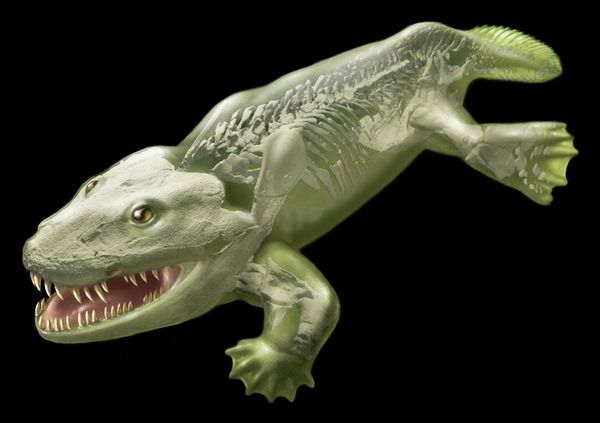
British scientists have discovered that Ichthyostega, one of the first creatures to step on land, could not have walked on four legs as 3D computer models show.
Textbook pictures of the 360-million-year-old animal moving like a salamander are incorrect, say scientists.
Instead, it would have hauled itself from the water using its front limbs as crutches, research in Nature suggests.
The move from living in water to life on land – a pivotal moment in evolution – must have been a gradual one.
Ichthyostega is something of an icon in the fossil world. Living during the Upper Devonian period, it was dubbed a “fishapod”, with its mixture of fish-like and amphibious features.

Although it probably spent much of its time under water, at times it was thought to have crawled halfway up onto land on limb-like flippers.
Exactly how it moved on land has been a matter of much debate, however.
Now, a team from The Royal Veterinary College, London and the University of Cambridge, has spent three years reconstructing the first 3D computer model of Ichthyostega from fossils.
It enabled them to study how ancient vertebrates made the “monumental transition” from swimming to walking.
Study author Dr. Stephanie Pierce, of The Royal Veterinary College, said the 3D skeleton allowed them to calculate the range of movement in the joints of its limbs for the first time.
The research suggests the animal shuffled on land using hind limb movements similar to that seen in seals rather than moving its limbs in the familiar walking pattern seen today.
Dr. Stephanie Pierce said: “We’re almost bringing the animal back to life by doing this.
“What we’ve discovered is that some early tetrapods definitely did not have the ability to walk on land. We at this stage are not actually sure which animals – or group of animals – were the first to do this.”
Co-author Prof. Jenny Clack from the University of Cambridge added: “Our reconstruction demonstrates that the old idea, often seen in popular books and museum displays, of Ichthyostega looking and walking like a large salamander, with four sturdy legs, is incorrect.”
The research, reported in a paper in Nature, was funded by the Natural Environment Research Council in UK.